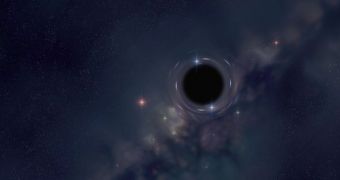They are out there, we know what kind of destruction their capable of, however we have also been lucky enough not have such an object forming in the vicinity of our solar system. Or haven't we? Our biggest threat right now, however, doesn't come from black holes, death rays of any kind or other impending disaster. It comes from asteroids, rogue pieces of rock traveling through our solar system. And as that wasn't hard enough, here come the primordial black hole which could easily swing a rock or two towards the Earth.
This is just a theory, but if it weren't, we wouldn't be able to defend ourselves anyway. Primordial black holes are described by physics as remnants of the early universe, black holes only a few meters in diameter with a mass as large as that of Earth. Take one primordial black hole, and plant it in the middle of the asteroid belt and disaster in guaranteed to follow.
It is widely believed that primordial black holes, unlike traditional black holes, are invisible to us. Not that regular black holes would be more visible to us, but primordial black holes are also thought to be among the candidates for dark matter in the universe. And if we consider that 75 percent of the mass of the universe is represented by dark matter, then if the presumptions are correct then primordial black holes should be just about everywhere.
Author of the study, Alexander Shatskiy from the Lebedev Institute in Moscow, reveals that, if a primordial black hole made entirely of dark matter is to cross the asteroid belt, it would most certainly alter the orbit of one or more asteroids and send it speeding towards our planet.
Daniel Holz from the Los Alamos National Laboratory, on the other hand, points out that not only primordial black holes could create such a scenario. "If anything comes through and disrupts those clouds, we could be in trouble," said Holz. However, Shatskiy's scenario is the worst case of all. Calculations reveal that an impact of an asteroid ejected from the asteroid belt by the presence of a primordial black hole would only take place once every 100 million years or so.
Good news? Maybe, maybe not. For what we know an asteroid could hit the Earth tomorrow.

 14 DAY TRIAL //
14 DAY TRIAL //